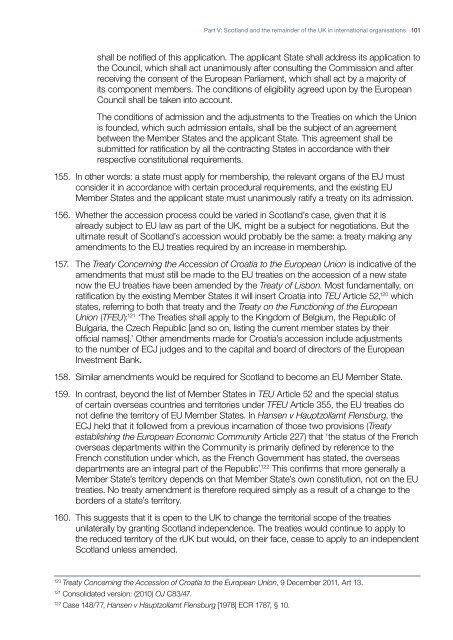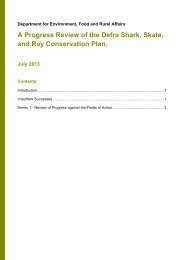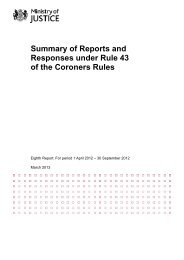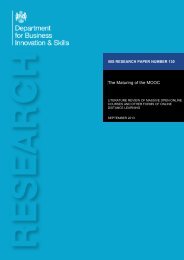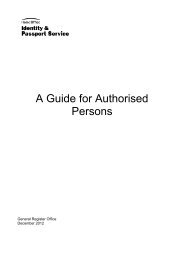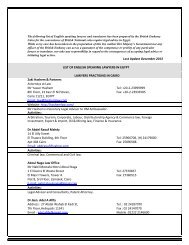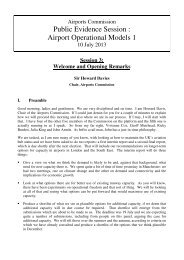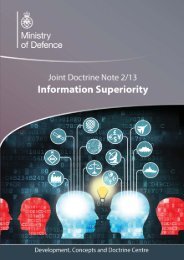Referendum on the Independence of Scotland ... - Gov.uk
Referendum on the Independence of Scotland ... - Gov.uk
Referendum on the Independence of Scotland ... - Gov.uk
Create successful ePaper yourself
Turn your PDF publications into a flip-book with our unique Google optimized e-Paper software.
Part V: <strong>Scotland</strong> and <strong>the</strong> remainder <strong>of</strong> <strong>the</strong> UK in internati<strong>on</strong>al organisati<strong>on</strong>s 101<br />
shall be notifed <strong>of</strong> this applicati<strong>on</strong>. The applicant State shall address its applicati<strong>on</strong> to<br />
<strong>the</strong> Council, which shall act unanimously after c<strong>on</strong>sulting <strong>the</strong> Commissi<strong>on</strong> and after<br />
receiving <strong>the</strong> c<strong>on</strong>sent <strong>of</strong> <strong>the</strong> European Parliament, which shall act by a majority <strong>of</strong><br />
its comp<strong>on</strong>ent members. The c<strong>on</strong>diti<strong>on</strong>s <strong>of</strong> eligibility agreed up<strong>on</strong> by <strong>the</strong> European<br />
Council shall be taken into account.<br />
The c<strong>on</strong>diti<strong>on</strong>s <strong>of</strong> admissi<strong>on</strong> and <strong>the</strong> adjustments to <strong>the</strong> Treaties <strong>on</strong> which <strong>the</strong> Uni<strong>on</strong><br />
is founded, which such admissi<strong>on</strong> entails, shall be <strong>the</strong> subject <strong>of</strong> an agreement<br />
between <strong>the</strong> Member States and <strong>the</strong> applicant State. This agreement shall be<br />
submitted for ratifcati<strong>on</strong> by all <strong>the</strong> c<strong>on</strong>tracting States in accordance with <strong>the</strong>ir<br />
respective c<strong>on</strong>stituti<strong>on</strong>al requirements.<br />
155. In o<strong>the</strong>r words: a state must apply for membership, <strong>the</strong> relevant organs <strong>of</strong> <strong>the</strong> EU must<br />
c<strong>on</strong>sider it in accordance with certain procedural requirements, and <strong>the</strong> existing EU<br />
Member States and <strong>the</strong> applicant state must unanimously ratify a treaty <strong>on</strong> its admissi<strong>on</strong>.<br />
156. Whe<strong>the</strong>r <strong>the</strong> accessi<strong>on</strong> process could be varied in <strong>Scotland</strong>’s case, given that it is<br />
already subject to EU law as part <strong>of</strong> <strong>the</strong> UK, might be a subject for negotiati<strong>on</strong>s. But <strong>the</strong><br />
ultimate result <strong>of</strong> <strong>Scotland</strong>’s accessi<strong>on</strong> would probably be <strong>the</strong> same: a treaty making any<br />
amendments to <strong>the</strong> EU treaties required by an increase in membership.<br />
157. The Treaty C<strong>on</strong>cerning <strong>the</strong> Accessi<strong>on</strong> <strong>of</strong> Croatia to <strong>the</strong> European Uni<strong>on</strong> is indicative <strong>of</strong> <strong>the</strong><br />
amendments that must still be made to <strong>the</strong> EU treaties <strong>on</strong> <strong>the</strong> accessi<strong>on</strong> <strong>of</strong> a new state<br />
now <strong>the</strong> EU treaties have been amended by <strong>the</strong> Treaty <strong>of</strong> Lisb<strong>on</strong>. Most fundamentally, <strong>on</strong><br />
ratifcati<strong>on</strong> by <strong>the</strong> existing Member States it will insert Croatia into TEU Article 52, 120 which<br />
states, referring to both that treaty and <strong>the</strong> Treaty <strong>on</strong> <strong>the</strong> Functi<strong>on</strong>ing <strong>of</strong> <strong>the</strong> European<br />
Uni<strong>on</strong> (TFEU): 121 ‘The Treaties shall apply to <strong>the</strong> Kingdom <strong>of</strong> Belgium, <strong>the</strong> Republic <strong>of</strong><br />
Bulgaria, <strong>the</strong> Czech Republic [and so <strong>on</strong>, listing <strong>the</strong> current member states by <strong>the</strong>ir<br />
<strong>of</strong>fcial names].’ O<strong>the</strong>r amendments made for Croatia’s accessi<strong>on</strong> include adjustments<br />
to <strong>the</strong> number <strong>of</strong> ECJ judges and to <strong>the</strong> capital and board <strong>of</strong> directors <strong>of</strong> <strong>the</strong> European<br />
Investment Bank.<br />
158. Similar amendments would be required for <strong>Scotland</strong> to become an EU Member State.<br />
159. In c<strong>on</strong>trast, bey<strong>on</strong>d <strong>the</strong> list <strong>of</strong> Member States in TEU Article 52 and <strong>the</strong> special status<br />
<strong>of</strong> certain overseas countries and territories under TFEU Article 355, <strong>the</strong> EU treaties do<br />
not defne <strong>the</strong> territory <strong>of</strong> EU Member States. In Hansen v Hauptzollamt Flensburg, <strong>the</strong><br />
ECJ held that it followed from a previous incarnati<strong>on</strong> <strong>of</strong> those two provisi<strong>on</strong>s (Treaty<br />
establishing <strong>the</strong> European Ec<strong>on</strong>omic Community Article 227) that ‘<strong>the</strong> status <strong>of</strong> <strong>the</strong> French<br />
overseas departments within <strong>the</strong> Community is primarily defned by reference to <strong>the</strong><br />
French c<strong>on</strong>stituti<strong>on</strong> under which, as <strong>the</strong> French <strong>Gov</strong>ernment has stated, <strong>the</strong> overseas<br />
departments are an integral part <strong>of</strong> <strong>the</strong> Republic’. 122 This c<strong>on</strong>frms that more generally a<br />
Member State’s territory depends <strong>on</strong> that Member State’s own c<strong>on</strong>stituti<strong>on</strong>, not <strong>on</strong> <strong>the</strong> EU<br />
treaties. No treaty amendment is <strong>the</strong>refore required simply as a result <strong>of</strong> a change to <strong>the</strong><br />
borders <strong>of</strong> a state’s territory.<br />
160. This suggests that it is open to <strong>the</strong> UK to change <strong>the</strong> territorial scope <strong>of</strong> <strong>the</strong> treaties<br />
unilaterally by granting <strong>Scotland</strong> independence. The treaties would c<strong>on</strong>tinue to apply to<br />
<strong>the</strong> reduced territory <strong>of</strong> <strong>the</strong> rUK but would, <strong>on</strong> <strong>the</strong>ir face, cease to apply to an independent<br />
<strong>Scotland</strong> unless amended.<br />
120 Treaty C<strong>on</strong>cerning <strong>the</strong> Accessi<strong>on</strong> <strong>of</strong> Croatia to <strong>the</strong> European Uni<strong>on</strong>, 9 December 2011, Art 13.<br />
121 C<strong>on</strong>solidated versi<strong>on</strong>: (2010) OJ C83/47.<br />
122 Case 148/77, Hansen v Hauptzollamt Flensburg [1978] ECR 1787, § 10.


